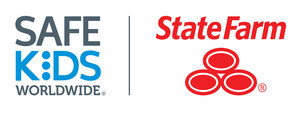
Safe Kids Worldwide Issues National Alert
Eight Child Heatstroke Deaths in Seven Days
Record Numbers of Children Dying in Vehicles This Week
WASHINGTON, Aug. 9, 2012 /PRNewswire/ -- A five-month-old boy from Tennessee was the eighth child to die from heatstroke in a vehicle in the past seven days, bringing this year's total deaths to 23. Safe Kids Worldwide is issuing a national alert to stop these heartbreaking and entirely preventable tragedies.
"Whether you are a parent, caregiver or just a concerned bystander, you can help save lives," says Kate Carr, President and CEO of Safe Kids Worldwide. "We are urging everyone to ACT: Avoid hyperthermia-related deaths by never leaving your child alone in a car and always locking doors and trunks; Create reminders and habits for you and your child's caregivers to ensure you don't forget your child; and Take action if you see a child unattended in a vehicle by immediately calling 911."
According to the National Oceanic and Atmospheric Administration, this past July was the hottest month on record for the nation. With more hot weather to come and the record number of deaths in the first week of August, it's critical to get the word out. Even on a mild day, temperatures inside a car can rise nearly 20 degrees in 10 minutes. Leaving a window slightly open has no effect on the temperatures inside a car.
Every year, children die of heatstroke, also known as hyperthermia, while unattended in vehicles. Safe Kids warns that these deaths can happen anytime, anywhere. In partnership with the National Highway Traffic Safety Administration, Safe Kids and its network of 600 coalitions are focused on raising awareness to stop these needless deaths.
"More than 550 children have died this way since 1998," said Carr. "Most people don't think this could possibly happen to them, yet it does."
Heat stroke happens when the body cannot cool itself fast enough and the core temperature rises to dangerous levels. Children's bodies heat up three to five times faster than an adult's.
"Kids react differently to heat than adults," says Dr. Leticia Ryan of Children's National Medical Center, Emergency Medicine and Trauma Services. "Infants and young children haven't fully developed the internal systems regulating body temperature, putting them at much greater risk for organ failure and death when exposed to excessive heat. We see this all too often in the emergency room, and it's absolutely devastating."
Since 1998, more than half of fatalities occurred when a distracted caregiver forgot their child was in the car. Thirty percent occurred when a child was playing in an unattended vehicle and became trapped and seventeen percent were intentionally left.
Together, we can cut down the number of deaths and near-misses by remembering to ACT.
- Avoid heat stroke-related injury and death by:
- Never leaving your child alone in the car, even for a minute.
- Consistently locking unattended vehicle doors and trunks.
- Create reminders and habits that give you and your child's caregiver a safety net:
- Establish a peace-of-mind plan. When you drop off your child, make a habit of calling or texting all other caregivers, so all of you know where your child is at all times.
- Place a purse, briefcase, gym bag, cell phone or an item that is needed at your next stop in a back seat.
- Set the alarm on your cell phone or computer calendar as a reminder to drop your child off at childcare.
- Take action if you see an unattended child in a vehicle:
- Dial 911 immediately and follow the instructions that emergency personnel provide – they are trained to determine if a child is in danger.
For more information on preventing child heat stroke deaths, please visit www.safekids.org/heatstroke.
About Safe Kids Worldwide
Safe Kids Worldwide is a global network of organizations dedicated to providing parents and caregivers with practical and proven resources to protect kids from unintentional injuries, the number one cause of death to children in the United States. Throughout the world, almost one million children die of an injury each year, and every one of these tragedies is preventable. Safe Kids works with an extensive network of more than 600 coalitions in the U.S. and in 23 countries to reduce traffic injuries, drownings, falls, burns, poisonings and more. Since 1988, Safe Kids has helped reduce the U.S. childhood death rate from unintentional injury by 53 percent. Working together, we can do much more for kids everywhere. Join our effort at safekids.org.
SOURCE Safe Kids Worldwide







Share this article